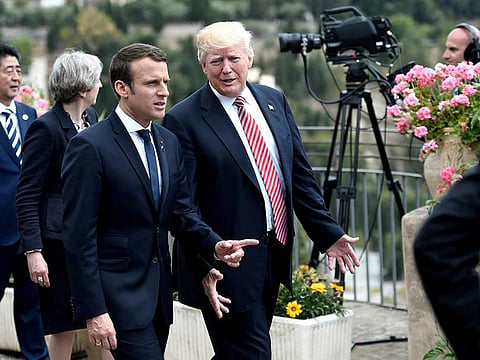Europe has to move beyond Trump
US president’s lack of interest in Nato allies is likely to pave the way for a new policy to take root in the continent

United States President Donald Trump’s first trip abroad has generated some comments in America on the successful first leg of the journey, whereas in Europe, reactions focused more significantly on the new president’s vision — or poor vision, and his way of putting things forward.
The Middle East leg of the tour called for few remarks. Trump did not say much, and he did not disappoint anybody — a significant difference with the speech of former US president Barack Obama in 2009 in Cairo. The stopover at the Vatican will be remembered for Pope Francis’ appeal to Trump, asking him to be “a man of peace”.
The Nato meeting, on the contrary, highlighted two interesting points. First, as far as the method is concerned, Europeans have noticed that an institution “which lost most of its raison d’etre” would finally not be that useless, especially if the members increase their share in its financing — nothing really new on the American side. A conclusion is that Trump may change his mind or more likely, understands that whoever leads US foreign policy will still have the last word.
Another point is the expansion of Nato’s missions, which will now encompass the “fight against terrorism”. The outdated George W. Bush-era concept of “war against terrorism” is thus not yet dead, which is all but reassuring in consideration of the way terrorism was born and is developing. But Trump did not move really further ahead — he did not even specifically refer to Article 5 of the charter, which guarantees military support to Nato members if any one or more of them are attacked. More significantly, Trump deemed more useful to reiterate attacks on the commercial side of the transatlantic relationship, renewing hard comments against Germany and “these bad people who sell too much cars in the US”.
One could admit that doing so, Trump focused once again on his electoral basis and his slogan “I only care for you”. Still, as an ally, the European Union can hardly be satisfied with that kind of limited support, even though the so-called ‘Russian threat’ is probably not what he thinks it is. Still, Trump visited the European Union (EU) headquarters in Brussels, a place previously nicknamed “an empty flat”, and a proof he now knows what the EU stands for.
In the end, the European leg did not bring anything new — and the G-7 gathering in Sicily did not change anything either: A confused American foreign policy is not what allies are waiting for, even though Trump cares little about it. Such a backdrop with so many holes in it may, on the contrary, open a window for those EU country-members who think time is now ripe to define and lead a truly European policy that is more favourable to the continent’s own interests.
The developing argument between Trump and German Chancellor Angela Merkel fits into that context.
Newly-elected French President Emmanuel Macron is another element to be taken into consideration. The meeting between Trump and Macron, “a frank and pragmatic dialogue”, offers France the opportunity to once again take the initiative that it had to relinquish as a result of the disastrous policies followed by Macron’s predecessor. Yet, one needs to start a discussion between the US and Europe and the few minutes that Trump is able to spare while listening to someone doesn’t augur well.
The difference between Trump and Russian President Vladimir Putin, who has just been to Paris to meet Macron, underlines the contrast of this new international situation. Putin is a straightforward person who thinks that “Russia comes first”. But Putin knows he is living along the European borders. He is well aware of the disastrous effect the European sanctions have had on Russian economy in the aftermath of the Ukrainian crisis. He knows that his approach on Syria cannot be the same as that of Trump’s, but both of them could get closer to a common position with regard to Europe, whose main security concern now is a follow-up of all those extremists who had been involved in the fighting in Syria and who have now returned to their countries of origin.
Trump is said to have been weakened by the domestic issues he faces. Maybe, but is it a major concern for Europe? What Trump’s trip means is that there is a new way for Europe to move forward. What Putin’s trip to Paris means is that there is an interlocutor to discuss with. And nature hates void.
Luc Debieuvre is a French essayist and a lecturer at IRIS (Institut de Relations Internationales et Strategiques) and the ‘FACO’ Law University of Paris.


